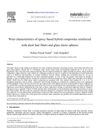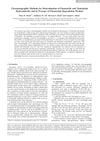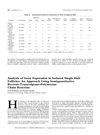 7 citations,
January 2018 in “Materials Today: Proceedings”
7 citations,
January 2018 in “Materials Today: Proceedings” Adding human hair fibers and glass micro-spheres to epoxy improves its wear resistance and strength.
6 citations,
February 2022 in “European journal of endocrinology” The method can measure multiple hormones in women's hair and may help identify hormone-related health issues.
 6 citations,
July 2005 in “Farmaco”
6 citations,
July 2005 in “Farmaco” A quick and simple method was created to identify minoxidil in hair-growth products using micellar electrokinetic capillary chromatography.
 4 citations,
March 2021 in “Journal of Surfactants and Detergents”
4 citations,
March 2021 in “Journal of Surfactants and Detergents” Shampoo B, which uses water-soluble silicone, is better at detangling hair in wet conditions due to its two-layer conditioning film.
 4 citations,
March 2019 in “Acta Chromatographica”
4 citations,
March 2019 in “Acta Chromatographica” Two methods can measure finasteride and tamsulosin hydrochloride; HPLC is more advantageous, while TLC offers better separation.
 4 citations,
January 2016 in “Journal of analytical & bioanalytical techniques”
4 citations,
January 2016 in “Journal of analytical & bioanalytical techniques” The herbal hair gel could be a safe hair growth treatment with minimal side effects.
4 citations,
May 2013 in “PubMed” Minoxidil in Espumil foam stays stable for at least 90 days at room temperature.
 4 citations,
January 2013 in “Dissolution Technologies”
4 citations,
January 2013 in “Dissolution Technologies” A method was developed to test the breakdown of Finasteride capsules, showing it can tell the difference between different brands and highlighting the need for standard tests and ingredient consistency.
3 citations,
March 2010 in “International Journal of Cosmetic Science” Functionalized silicones improve hair appearance, combing, and manageability.
 2 citations,
March 2017 in “Veterinary dermatology”
2 citations,
March 2017 in “Veterinary dermatology” Herbal paste and oil extract might improve dog hair quality by retaining lipids.
 2 citations,
January 2016 in “Scientifica”
2 citations,
January 2016 in “Scientifica” Researchers created a reliable method to measure dexpanthenol and resorcinol in hair products.
 1 citations,
January 2019 in “Journal of The Korean Institute of Illuminating and Electrical Installation Engineers”
1 citations,
January 2019 in “Journal of The Korean Institute of Illuminating and Electrical Installation Engineers” LED light at specific wavelengths can help fight dandruff and promote hair growth without increasing inflammation.
 1 citations,
October 2017 in “Food Additives & Contaminants: Part A”
1 citations,
October 2017 in “Food Additives & Contaminants: Part A” A new minoxidil-like substance, triaminodil, was found in an illegal hair growth supplement.
 September 2024 in “Journal of the American Academy of Dermatology”
September 2024 in “Journal of the American Academy of Dermatology” The compounded topical solution is safe, stable, and effective for personalized alopecia treatment.

TrichoFoam™ is a stable option for personalized hair loss treatment with most ingredients remaining effective for 90-180 days.
 February 2024 in “Drug Delivery and Translational Research”
February 2024 in “Drug Delivery and Translational Research” A new liposomal formulation improves drug delivery and hair growth for treating hair loss without causing skin irritation.
 December 2023 in “International Journal of Newgen Research in Pharmacy & Healthcare”
December 2023 in “International Journal of Newgen Research in Pharmacy & Healthcare” Both herbal and synthetic shampoos in India are generally safe and effective.
 November 2023 in “ACS Applied Polymer Materials”
November 2023 in “ACS Applied Polymer Materials” The new method extracts keratin from hair faster and better, and the resulting product improves blood clotting and wound healing, with potential for personalized treatments.
 September 2023 in “Biomedicines”
September 2023 in “Biomedicines” Squalene may be a marker for certain types of alopecia.
 June 2023 in “Brazilian Journal of Health Review”
June 2023 in “Brazilian Journal of Health Review” Hair transplantation improves life quality and self-esteem in men with male pattern baldness.

New methods to classify curly hair types were developed based on shape and strength.
December 2021 in “Jurnal Farmanesia” The document does not state whether Virgin Coconut Oil or Palm Kernel Oil affects rabbit hair growth.
 August 2021 in “International Journal of Research in Dermatology”
August 2021 in “International Journal of Research in Dermatology” Amarantha hair oil contains β-sitosterol, which helps promote hair growth.
 September 2020 in “Journal of Cosmetic Science”
September 2020 in “Journal of Cosmetic Science” The caffeine content in anticellulite gels is 0.7-1.7% and in hair-care products is about 1.0%.
The best way to apply vitamin C to the skin is with a nanostructured lipid carrier formulation.
January 2020 in “Journal of the Brazilian Chemical Society” Tiny lipid particles loaded with a hormone gather in hair follicles, which may help treat hair loss.
July 2018 in “Current Analytical Chemistry” The method effectively detects minoxidil in hair-growth products.
 April 2018 in “Journal of Investigative Dermatology”
April 2018 in “Journal of Investigative Dermatology” Sensitive scalp has higher pH, more redness, abnormal sebum, and altered bacterial makeup.
January 2014 in “Food and Drug” The method accurately detects illegal minoxidil in herbal hair products.
 May 1995 in “Journal of Investigative Dermatology”
May 1995 in “Journal of Investigative Dermatology” Researchers developed a new way to measure gene activity in single hair follicles and found that a specific gene's activity changes with different amounts and times of treatment.






















